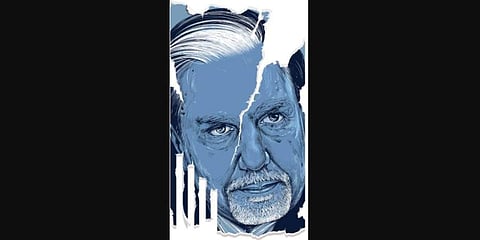

Thursday was the final meltdown for Zee Entertainment Enterprises Ltd (ZEEL). In a series of block deals, chairman and founder Subhash Chandra and his family sold 15.7 per cent of their promoter holding to institutional investors, reducing their stake to just 5 per cent.
The sell-off raised Rs 4,343 crore, which will go towards repaying creditors with whom Chandra’s holding company had run up defaults of over Rs 7,000 crore.
The family is keen to keep management control, but left with such a tiny holding, will they manage to hang on? As of now, yes, as the largest single shareholder Invesco Oppenheimer Fund, which has 18.7 per cent, is supporting Chandra. This year has been a rough ride for India’s broadcasting pioneer.
It started with a run on the ZEEL scrip in January, when in a single day it lost 26 per cent, shaving off Rs 14,000 crore from its group companies’ market capitalisation. In February, and in April, mutual funds and investors threatened to sell off pledged Zee shares; but the Chandras managed a reprieve till September 30.
In a poignant letter written in April, Chandra apologised to the financial community for the stock crash. He frankly admitted he had made mistakes, he asserted he was “not running away” and said he was the first promoter “who has dared to sell the jewel of his crown, to pay off the liabilities”. He has tried to keep his word, in the process sacrificing much of what he has built over the last 30 years.
The great gambler
There has always been the gambler in Chandra. As a young man in 1973, he took over a crumbling grain refining and trading business from his grandfather, Jagannath Goenka; and by 1990, on the back of a few lucrative Russian export contracts for rice and soyabean, built up a thriving Rs 250 crore business.
He had nothing to do with broadcasting, but watching the Gulf War on CNN in a Kuwait hotel convinced him that was where the excitement lay. In the days of state monopoly over TV, he beat the rules with a transponder leased from Richard Li of Satellite Television Asia Region (STAR) in 1992 and began beaming from Hong Kong, making Zee the first private channel in the country.
He hadn’t reckoned that the wily Rupert Murdoch too had his eyes on India. Zee dominated the airwaves in the 1990s but NewsCorp’s Star TV made a comeback with Kaun Banega Crorepati? Since then it has been a ding-dong battle between the two giants.
Chandra has a yen for seeing an opportunity, but some bets still go wrong. His 1999 ‘Agrani’ satellite project in joint venture with ICO Global to provide wireless satellite communication in India with geo-centric satellite systems flopped miserably as mobile telephony had made that technology redundant. Later, in 2004, his attempts to secure BCCI’s cricket rights and launch the Indian Cricket League (ICL) in competition with IPL, also went awry burning a Rs 350 crore hole in his pocket.
Infra misadventure
While cricket and the Agrani Satellite project were close to Zee’s core competency, Chandra from 2011 began the Essel Group’s diversification into the unchartered territory of infrastructure. This proved fatal. Initially, Essel Infra notched up orders for road building, airports and even a ‘sports city’ in Bhopal.
All his required heavy capital expenditure, but erratic repayments and difficult delivery schedules began to bleed the group.
Himanshu Mody, then Zee spokesperson, said: “We had to hedge our risks. Broadcasting is a high tension fight; the cable business is in a mess. How long can we tie ourselves down grappling with these issues?”
When this writer met Chandra wearing a smart airman’s toppee a little over a year backclaiming he had retired, the unpredictable media chief was still keeping busy planning a foray into rural education and had just acquired an old sea liner to begin a new business of luxury cruises! It was this itch for expansion into unchartered waters, and his over-extended business positions, that led to pledging the shares of his flagship firm; and this ultimately stacked up a portfolio of back-breaking debt.
Credit is due to Chandra as he concedes in his April letter: “As most of the infra companies, even we have made some incorrect bids ... My obsession of not walking away from the situation has made me bleed Rs 4,000 crore to Rs 5,000 crore.”
All this does not take away from the fact that ZEEL is a good performer. It reported revenues of Rs 7,933.9 crore in FY 2019, growing at 12.4 per cent annually over the past five years. Its profit-after-tax for the year was a healthy Rs 1,567. The network runs 41 channels and has an all-India TV viewership share of 19.7 per cent. On this solid foundation, Chandra can spring a surprise and bounce back. Provided, he manages to keep management control.
Rs 4,343 cr go towards repaying creditors with whom it had defaults
Rs 14,000 cr shaved off in a single day from its group companies in January